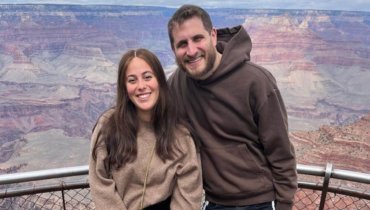Nechuma Schweitzer Went from Makom Member To Staff Member — Here’s Her Story
Nechuma Schweitzer had an upbringing that didn’t quite serve her. She grew up in a Hasidic community and something about it didn’t feel right. She didn’t connect to what she was learning and didn’t feel comfortable asking questions to get answers that might change that.
She didn’t even want to get married or have children because she saw the world as a “dark, horrible place to be.” While her siblings and other community members did connect more to the world she was living in, Nechama needed to take a different path. The home she was brought up in didn’t allow for all feelings, it didn’t necessarily honor her big ones, and she needed a place to rediscover the woman and girl she was inside.
This doesn’t mean that’s what Judaism says is, but that’s what Nechama’s experience unfortunately was. When she was 20, she got married for a very brief time because she felt like she needed to do so but was divorced soon after. She lived by herself after that which was what she initially wanted to do and focused on her career.
For a while, she lived a “double life,” as she calls it. She still lived in the community, but felt that the things she wanted for her life on the inside didn’t match her surroundings. After falling into a deep depression, she decided to leave.
A couple of months later, about six years ago, she found Makom, a branch of our organization that helps disenfranchised Haredi Jews find a positive place in Orthodoxy.
When she joined, Nechuma was placed in different homes for Shabbos and was taken aback by what she saw. “I had this feeling deep inside to experience Shabbos, the only way I can describe it was that my Jewish soul yearned for it,” she shares. “When I was in these homes, what I saw was completely different from the way I was raised.”
She describes the meals with more family interaction — parents and kids would hug, kiss, feel excited about Shabbos. Instead of men at one side of the table and women at the other having two different sets of conversations, things were mixed and women contributed as much as the men did. Kids were excited to see their fathers come home from shul and would run to them when they walked in the door.
“There was a certain joy, love and connection that was missing from my Shabbos experiences growing up,” she explains.
To reiterate, this doesn’t speak for all Hasidim. Nechuma even says that many were happy with her family dynamic and did feel joy and connection. “For me, for some reason, that wasn’t enough. I was willing to give it all up because it didn’t mesh with who I was and what I wanted out of life. Sometimes even with the same family dynamics you have different siblings who just choose a different lifestyle.”
Questioning to Find Peace
“I had so many questions about God and who God is,” she continues. For a while, Nechuma felt that being Jewish was a burden, a religion solely filled with laws and customs. Through questioning, she was able to make peace and find the spirituality that exists richly within the religion.
She would ask nonstop and get responses without any judgment. Rabbis would bring sources that she had never heard about before. She challenged a lot in the classes Makom offered. “I did a lot of back and forth questioning until I felt like I heard enough of the different perspectives that things started settling down for me,” she says. “I had gotten enough information and was able to figure out what works. It wasn’t this one size fits all mentality where everyone has to do the same thing.”
Before Makom, Nechuma viewed the world as black and white. Now, she sees it more vibrantly. “I used to say there are shades of gray, but then I saw a JITC video about an artist and now I like to say it’s shades of the rainbow. The world and Torah are so beautiful and colorful. There are so many different ways to understand every single thing. There’s so much depth to Judaism.”
Just because Nechuma has found a certain level of peace now doesn’t mean she’s stopped asking those questions. When she feels like she needs more information, she’ll choose to explore something instead of writing it off.
It wasn’t just Jewish exploration that Makom helped with though, it was internal work to learn how to re-parent the hurt child inside of her. Nechuma had been in therapy for seven years when she joined Makom, which she says a lot of was managing her day-to-day life.
In the past couple of years, things started to go deeper. “My past kept coming up for me and I wasn’t able to face it…I would spiral,” she shares. “Then [Allison] told me about the inner child work.”
Nechuma heard about ideas of working with your inner child from Allison Josephs and Makom after Allison learned about them from Jasmin Lee Cori, a non-Jewish author who wrote the book, The Emotionally Absent Mother: How to Recognize and Heal the Invisible Effects of Childhood Emotional Neglect.
A lot of Makom members deal with similar things and Jasmin’s work was instrumental to helping them. Nechuma took these ideas to her therapist, who she says actually hadn’t heard of the concept, but ran with it.
She worked with Nechuma to learn how to validate her own feelings and truly show up for herself and the inner child in there. She learned to be her own parent when she was upset and really needed one.
“It’s a coping skill for me at this point when I find myself in situations when I’m sobbing or in so much pain and wish my mom was here to hug and tell me I’m okay and not alone,” she shares. “I can now stop myself and say okay, ‘I’m here for you, I’m holding you.’”
She even learned how to take it one step further and now channels that self-parenting to her relationship with God and Judaism. Once, she was reliving something from her past and broke down. As she was trying to soothe herself, she felt God’s presence there with her. “He was giving me these messages that said, ‘I love you, what you’re going through right now is painful but you’re not alone,’” she says.
While Nechuma feels that she’s very much still on a journey, she has a toolkit to deal with the pain as it comes up. She’s at a place where she can give back to others as a Makom staff member now. Instead of feeling dark, she feels hope. Instead of the self-hate, she feels love. So much so, that she is newly open to getting married and having a family.
“The biggest thing to know is you’re not alone, you don’t have to be,” she says. “It takes courage to make that jump, but there’s so much love and acceptance on the other side.”
If you found this content meaningful and want to help further our mission through our Keter, Makom, and Tikun branches, please consider becoming a Change Maker today.








1 comment
Sort by
Wow, what a story! Allison, you’re amazing! As is this beautiful woman!